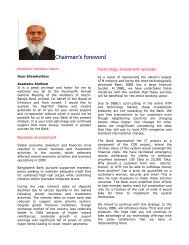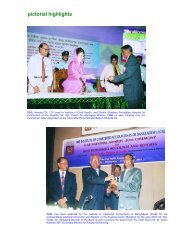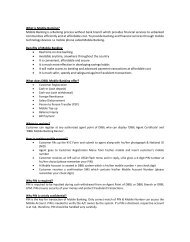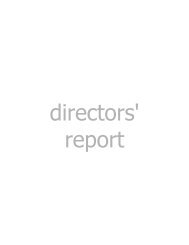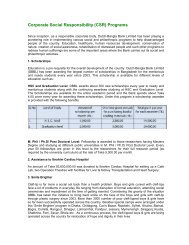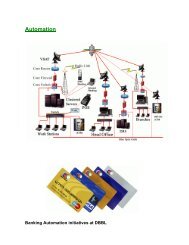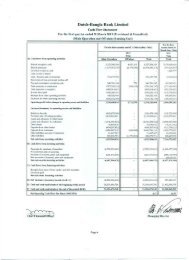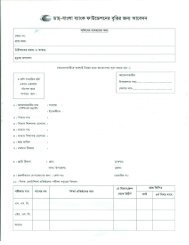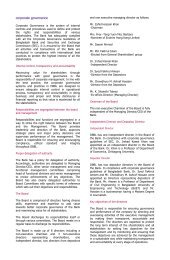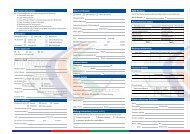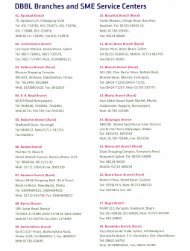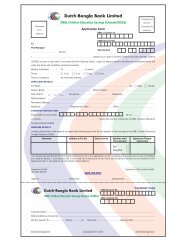directors' report - Dutch-Bangla Bank Limited
directors' report - Dutch-Bangla Bank Limited
directors' report - Dutch-Bangla Bank Limited
Create successful ePaper yourself
Turn your PDF publications into a flip-book with our unique Google optimized e-Paper software.
directors’ <strong>report</strong><br />
Bismillahir Rahmanir Rahim<br />
Dear Fellow Shareholders<br />
The Board of Directors is pleased to welcome the<br />
honorable shareholders in the 15th Annual General<br />
Meeting of the <strong>Bank</strong>. The Directors' Report along<br />
with audited financial statements and auditors'<br />
<strong>report</strong> thereon for the year ended December 31,<br />
2010 are presented before your kind self.<br />
In the <strong>report</strong>, DBBL's operational performance of<br />
2010 as compared to 2009 has been evaluated and<br />
analyzed within the prevailing business<br />
environment. The information and analysis may be<br />
read in conjunction with the DBBL's audited<br />
financial statements which have been prepared in<br />
accordance with <strong>Bangla</strong>desh Accounting Standards,<br />
<strong>Bangla</strong>desh Financial Reporting Standards and<br />
applicable legal and regulatory requirements.<br />
REVIEW OF BUSINESS OPERATIONS AND<br />
STRATEGY<br />
Principal activities<br />
The principal activities of DBBL are to provide all<br />
kinds of commercial banking products and services<br />
to the customers including project finance, working<br />
capital finance and trade finance for corporate<br />
customers, SME loans to small traders &<br />
businesses; and house building loan, car loan and<br />
wide range of life style and need based loans for<br />
retail customers. There are various deposit products<br />
particularly suitable for retail and institutional<br />
customers. Off-shore <strong>Bank</strong>ing operation was started<br />
in 2010. DBBL's state-of-the-art IT platform and<br />
online banking system provide the largest ATM<br />
network, Fast Track and POS services of the<br />
country through which customers are getting anybranch<br />
and anytime banking for 24 hours a day and<br />
365 days a year. IT network also provides SMS<br />
banking, alert banking and internet banking<br />
services. Debit cards of MasterCard International<br />
and DBBL's propriety cards are in operation. In<br />
addition, international cards (VISA & MasterCard) of<br />
different local & international banks are accepted at<br />
DBBL's ATMs for withdrawal of money and at POS<br />
terminals for payments of shopping, hotel and<br />
dining bills etc. DBBL introduced EMV supported<br />
Chip VISA Credit Cards for the first time in<br />
<strong>Bangla</strong>desh in 2009. EMV Credit Cards of<br />
MasterCard and EMV debit cards of MasterCard<br />
were introduced in 2010. The EMV feature shields<br />
DBBL customers from any kind of frauds as per the<br />
guidelines provided by MasterCard & VISA.<br />
Strategic plan for positioning the company for<br />
future growth through capacity building<br />
As part of its strategic plan, DBBL continued to<br />
invest heavily to improve and expand IT network,<br />
ATM services, Fast Track and card services along<br />
with branch network, business promotion and<br />
activities related to Social Cause. Though expenses<br />
on such investments in 2010 apparently reduced<br />
expected profit growth, however, these will<br />
substantially improve our capacity to deliver<br />
customer services with a wide range of products<br />
and services that can be matched with the best in<br />
the industry by strengthening IT platform,<br />
expanding distribution channels and communication<br />
networks and improving productivity. DBBL's<br />
strategic objective is to have a clear competitive<br />
advantage over its competitors to provide the full<br />
range of banking services via multiple delivery<br />
channels through state-of-the-art-technology at<br />
the lowest cost.<br />
Brand positioning<br />
Throughout its operation for last 15 years, DBBL<br />
has established itself as a different <strong>Bank</strong> from<br />
others. It has differentiated itself as a leader in<br />
technology by reaching the latest banking services<br />
to its customers through largest ATM network in the<br />
country at free or affordable cost. DBBL has created<br />
an unprecedented example by providing thiunique<br />
service at subsidized cost not only to its own<br />
customers but also to customers of many other<br />
banks. The service of ATM network has further<br />
strengthened in 2010 by introducing Fast Track with<br />
deposit kiosk to facilitate cash deposits by the<br />
valued customers of the <strong>Bank</strong>. It has also<br />
established itself as a <strong>Bank</strong> that cares for the<br />
society. All the business activities of DBBL are done<br />
in full conformity with social, ethical and<br />
environmental standards. DBBL is the pioneer in<br />
Social Cause programs in the country. It has been<br />
intensifying its resources and efforts on a<br />
continuous basis to reach the distressed & needy<br />
people of the society to bring smile on their face<br />
and to improve their quality of life.<br />
Customer focus and customers' right<br />
DBBL's performance can not be judged by just<br />
looking at profit figures. DBBL considers that it is<br />
the customers' right to get modern, online and full
anges of banking services at an affordable price at<br />
anytime and anywhere. DBBL's service cost is the<br />
lowest in the industry and in many cases services<br />
provided through ATM and Fast Track are free.<br />
DBBL is committed to put the customers' interest<br />
first. In line with its central vision, DBBL is promisebound<br />
to extend personalized services to the full<br />
satisfaction of the customers that should be the<br />
best in the industry.<br />
Corporate governance ensuring best practices<br />
DBBL complies with good corporate governance<br />
practices in line with industry best practices and<br />
regulatory requirements ensuring transparency,<br />
accountability and fairness at every step of its<br />
business operations to maximize performance with<br />
governance. Corporate governance practices in<br />
DBBL are set out on pages 41 to 53 of this Annual<br />
Report.<br />
Managing risks to ensure quality and value of assets<br />
and uninterrupted operations<br />
Risk management covering credit risks, operational<br />
risks and market risks is at the heart of all business<br />
operations and transactions of DBBL. Risk<br />
management systems are designed and<br />
implemented to ensure quality and value of assets,<br />
and smooth banking operations and services in a<br />
sustainable way to protect interest of shareholders,<br />
depositors and all the stakeholders. Risk<br />
management system also complies with <strong>Bangla</strong>desh<br />
<strong>Bank</strong>'s core risk management guidelines.
Progressive, healthy and safe working environment<br />
for staff<br />
A high quality and competent human resource is<br />
crucial to continued growth and success of any<br />
country which can be achieved by improving skill,<br />
knowledge and productivity of employees.<br />
Accordingly, how human resource is recruited,<br />
trained, developed & motivated has far reaching<br />
implication on long-term sustainable growth of the<br />
<strong>Bank</strong>. Customers' perception & satisfaction<br />
ultimately determines relative or absolute success<br />
or failure of an organization. In turn, we need a<br />
competent, well-trained, committed & motivated<br />
team of human resources with positive & sincere<br />
attitude towards customers that can build, maintain<br />
and strengthen trust & confidence in our customers<br />
that is crucial for our success.<br />
A talented, committed, skilled and fully motivated<br />
team of human resources is the main driving force<br />
for providing better, faster and coordinated services<br />
to the clients and for performing at the highest level<br />
in a fiercely competitive financial market like<br />
<strong>Bangla</strong>desh. Accordingly, the <strong>Bank</strong>'s strategy is to<br />
attract, retain and motivate the most talented<br />
people and providing them with healthy, safe and<br />
progressive working environment and competitive<br />
compensation package.<br />
HR policies are designed to long-term career growth<br />
- unleashing the hidden potential<br />
The <strong>Bank</strong>'s HR policies are based on trust and<br />
relationship. The <strong>Bank</strong>'s policy is to look after<br />
people who want to make a long-term career with<br />
the <strong>Bank</strong> because trust and relationship are built<br />
over time. Remuneration package may be an<br />
important factor to motivate for joining a company,<br />
but it is not the only one. The corporate culture at<br />
DBBL as grew over last 15 years is such that the<br />
members of the staff have ample opportunities to<br />
take initiative and responsibilities to unleash their<br />
hidden potential to maximize benefits for
themselves and for the society. The challenge is to<br />
maintain a business like, committed corporate<br />
culture that matches DBBL's mission. Achieving<br />
results and taking responsibility are important<br />
components of the culture we pursue, one in which<br />
management and staff work together and are<br />
mutually accountable.<br />
DBBL provides challenging but rewarding career<br />
where good values, fairness and hard work are<br />
highly encouraged.<br />
In case of DBBL, it is excellence of DBBL with good<br />
values, fairness, potential for success, scope to<br />
develop a broad interesting career etc. which<br />
attract people to join and work with DBBL. DBBL<br />
always encourages excellence in performance by<br />
rewards and recognition.<br />
Healthcare, safety standards and modern working<br />
environment<br />
● In order to ensure better healthcare of<br />
employees there is a medical consultant in<br />
the <strong>Bank</strong> where staff of DBBL can get<br />
medical advice and treatments.<br />
● In addition, a thorough medical checkup<br />
facility is provided to each employee on a<br />
yearly basis.<br />
● Medical allowance @ 10% of basic salary is<br />
paid to each employee which is tax-free.<br />
● In order to provide highly sophisticated and<br />
encouraging working environment, all the<br />
DBBL offices including head office and<br />
branches are equipped with modern<br />
facilities with air-conditioning and generator<br />
for power back up.<br />
● All DBBL offices including head office and<br />
branches are equipped with fire fighting<br />
material and have multiple exit points for<br />
emergency exit.<br />
Staff welfare schemes in DBBL<br />
A number of well thought out policies are in place<br />
for welfare of employees in DBBL those are in<br />
addition to competitive compensation package<br />
available in the industry:<br />
• DBBL Provident Fund,<br />
• DBBL Superannuation Fund,<br />
• DBBL Gratuity Fund,<br />
• House Building Loan Scheme,<br />
• Car Loan Scheme,<br />
• Festival bonus,<br />
• Performance bonus, and<br />
• Study leave.<br />
Career development and training program<br />
DBBL attaches utmost importance to the<br />
development of its employees through continuous<br />
training so that DBBL executives can have<br />
competitive advantage in the market. The training<br />
need of individual employees including training<br />
need for introducing new products, services and<br />
technology is evaluated on a continuous and<br />
systematic way. DBBL executives are encouraged to<br />
attend high quality training at home and abroad to<br />
develop and broaden existing knowledge and skills<br />
and to acquire new skills and expertise.<br />
We imparted training to 1,806 officers in 26<br />
different courses during 2010. The training<br />
programs were organized by our own training<br />
institute. We also nominated 142 officers to<br />
undergo 80 different training programs/courses<br />
organized by different organizations like <strong>Bangla</strong>desh<br />
Institute of <strong>Bank</strong> Management (BIBM), <strong>Bangla</strong>desh<br />
<strong>Bank</strong> Training Academy (BBTA) and other similar<br />
organizations. In addition, 9 executives were sent<br />
abroad for attending overseas training and<br />
workshop.<br />
Moreover, to strive hard for winning the challenges<br />
in a fiercely competitive market, the management<br />
has been constantly pursuing the following areas<br />
for professional and career development of<br />
employees:<br />
• To attract and retain best professionals in the<br />
industry.<br />
• Job evaluation, job enrichment, performance<br />
target, performance evaluation, and performance<br />
based compensation and incentives.<br />
• Evaluating the training need of individual<br />
employees including training need for introducing
new products, services and technology.<br />
• Arranging high quality training at home and<br />
abroad so that DBBL executives can have<br />
competitive advantage in the market.<br />
• Encouraging its employees to develop and<br />
broaden existing knowledge and skills and to<br />
acquire new skills and expertise.<br />
• Reviewing and updating organizational structure<br />
on a regular basis to have a structure, which can<br />
give strong support to the strategic objectives of<br />
the <strong>Bank</strong>.<br />
The number of DBBL staff increased by 978 in<br />
2010. At the end of 2010, number of staff stood at<br />
2,763 compared to 1,785 at the end of 2009.
CONTRIBUTION TO NATIONAL ECONOMY &<br />
NATIONAL EXCHEQUER<br />
Contribution to national economy<br />
Primarily our business strategies are based on<br />
goodwill and trust of the customers and other<br />
stakeholders. Our programs related to Social Cause<br />
help strengthen this trust. DBBL conducts its<br />
activities in responsible way to maximize value for<br />
its customers, stakeholders and the economy.<br />
Making technology affordable for masses to<br />
facilitate seamless transaction and socio-economic<br />
development<br />
In DBBL, banking products and services based on<br />
latest technology and multiple delivery channels are<br />
aimed at faster and better customer services at the<br />
doorsteps of customers at affordable cost. DBBL<br />
being the most technologically advanced <strong>Bank</strong> has<br />
established the largest ATM and Fast Track network<br />
of the country with a huge investment which is not<br />
at all financially rewarding. Still DBBL has taken<br />
these initiatives as part of its Social Cause programs<br />
to reach the benefits to the customers enabling<br />
them to make seamless transaction 24 hours a day<br />
across the country. At the end of 2010, such<br />
services were provided through 96 branches, 1,100<br />
ATMs, 50 Fast Tracks and a large number of POS<br />
terminals spread throughout the country.<br />
To widen and spread the benefit of the ATM and<br />
Fast Track network DBBL is allowing customers of<br />
other banks to use the network at nominal cost.<br />
DBBL is committed to spread the network even<br />
further to maximize socio-economic benefits of the<br />
country though it is not cost-effective for the <strong>Bank</strong>.<br />
By providing such services, DBBL is enabling the<br />
customers to maximize their business potentials and<br />
to fulfill their personal hopes and aspirations.<br />
Mobilization and allocation of resources in optimum<br />
way-extending loans to important sectors at<br />
reasonable interest rate and charges<br />
It is the policy of DBBL to mobilize resources from<br />
diversified sources to make it cost effective and<br />
sustainable to support business growth. Depositors<br />
are offered the best technology driven products &<br />
services available in the market to encourage them<br />
in savings. While resources are allocated at<br />
competitive rates preferably in most productive as<br />
well as export-oriented sectors to maximize<br />
economic and social development of the country.<br />
Resources are also allocated to farmers, people<br />
engaged in small business and trade and other<br />
individuals to make them self reliant so that they<br />
can fulfill their hopes and aspirations and lead a<br />
meaningful life and contribute to social progress.<br />
Credit-deposit ratio is contained within optimum<br />
limits to ensure utilization of resources within<br />
tolerable risks.<br />
In 2010, total liability, including capital, deposit,<br />
borrowing and others increased from Taka 81,788<br />
million to Taka 101,182 million. Number of deposit<br />
accounts increased from 761,120 to 1,352,870,<br />
Loans and advances increased from Taka 48,411<br />
million to Taka 67,658 million. Within loans, Taka<br />
18,879.6 million was given to SME, Taka 1,535.0<br />
million was given to retail and Taka 730.5 million<br />
was given to agriculture sector.<br />
Commitment to rural area and Supporting SME<br />
DBBL has seven SME/Agriculture branch and three<br />
SME service centers mainly in rural area to support<br />
SMEs and to bring related low income group under<br />
financial intermediation to help them become self<br />
reliant and unleash the potential of economic
growth in rural areas. The branches/centers also<br />
facilitate quick transfer of funds from home and<br />
abroad to rural people through ATMs at free of cost.<br />
Contribution to the national exchequer<br />
DBBL made significant contribution to the<br />
government in boosting its revenue collection. As<br />
per the prevailing law of the country, the <strong>Bank</strong><br />
being a corporate citizen pays tax and VAT on its<br />
own income. Besides, the <strong>Bank</strong> deducts income tax,<br />
VAT and excise duty at source from clients,<br />
depositors and suppliers, and deposits the same to<br />
the national exchequer.<br />
During the year 2010, the <strong>Bank</strong> contributed Taka<br />
2,353.0 million to national exchequer as against<br />
Taka 1,282.9 million in the previous year.<br />
Social Cause<br />
DBBL being a responsible corporate citizen of the<br />
country has been playing a pioneering role in<br />
implementing various social and philanthropic<br />
programs to help disadvantaged people of the<br />
country. Education, healthcare, human resource<br />
development, conservation of nature, creation of<br />
social awareness, rehabilitation of distress<br />
humanities and such other programs to redress<br />
human sufferings are some of the important areas<br />
where the <strong>Bank</strong> carries out its social and<br />
philanthropic activities.<br />
<strong>Dutch</strong>-<strong>Bangla</strong> <strong>Bank</strong> Foundation (DBBF) was<br />
established in 2001 for discharging dedicated<br />
activities related to Social Cause.<br />
In order to discharge its activities related to Social Cause programs in effective way DBBL established the <strong>Dutch</strong>-<br />
<strong>Bangla</strong> <strong>Bank</strong> Foundation (DBBF) in 2001 in which 5% pre-tax profit of the <strong>Bank</strong> was contributed on a yearly<br />
basis up to 2009. In addition, <strong>Bank</strong> also makes direct contribution towards highly important Social Cause<br />
programs in the area of education, healthcare etc. DBBL contribution to Social Cause Programs was Taka 107.5<br />
million in 2010 compared to Taka 206.0 million in 2009.<br />
DBBL is committed to eco-friendly business<br />
environment<br />
DBBL complies with environmental standard while<br />
financing industrial projects. Projects with likely<br />
adverse impact on environment are strongly<br />
discouraged by DBBL. We are trying to incorporate<br />
sound environmental management process in<br />
business operations of projects financed by us that<br />
can ensure healthy and sustainable lives for our<br />
future generations. DBBL introduced a guideline<br />
demanding assessment of environmental and social<br />
impacts of the projects to ensure that operations of<br />
the projects would be eco-friendly.<br />
DBBL is sponsoring social awareness programs for<br />
protecting the environment. Environmental<br />
degradation and depletion of natural resources are<br />
matters of great concern in <strong>Bangla</strong>desh like<br />
anywhere in the world. Environmental degradation<br />
is taking place due to poverty, over population and<br />
lack of awareness about the environment. It is<br />
manifested by deforestation, destruction of<br />
wetlands, depletion of soil nutrients etc. Natural<br />
calamities like floods, cyclones and tidal bores also<br />
result in severe socio-economic and environmental<br />
damage. DBBL has been continuously creating<br />
social awareness to protect the environment that is<br />
essential for present and future generations. With<br />
that end in view, DBBL is regularly advertising in<br />
print and electronic media to develop an ecofriendly<br />
society for sustainable and healthy human<br />
life.<br />
DEVELOPMENT IN IT INFRASTRUCTURE AND<br />
ONLINE BANKING SERVICES<br />
<strong>Dutch</strong>-<strong>Bangla</strong> <strong>Bank</strong> <strong>Limited</strong> owns the country's<br />
largest ATM network comprising of 1100 ATMs at<br />
the end of 2010. <strong>Bank</strong>'s all ATMs and POS terminals<br />
are EMV-compliant, introduced by Europay,<br />
MasterCard and VISA jointly to protect capturing<br />
card data. We are the first <strong>Bank</strong> in <strong>Bangla</strong>desh to<br />
ensure such security to protect the insterest of our<br />
valued customers. The ATM / POS network of the<br />
DBBL accepts the following cards:<br />
• EMV compliant chip cards of all the banks in the<br />
world;<br />
• Non-EMV Visa & MasterCard cards of all the banks<br />
in the world;<br />
• DBBL's proprietary cards (Nexus).<br />
DBBL ATM network is accessible by many banks of<br />
the country and abroad as well. In the month of
December, 2010 alone, the total count of Cash<br />
withdrawal from ATMs was 230 million and the<br />
corresponding amount of withdrawal was Taka<br />
13.20 billion.Fast Tracks were introduced for the<br />
first time in <strong>Bangla</strong>desh<br />
The <strong>Bank</strong> has also, for the first time in <strong>Bangla</strong>desh,<br />
introduced Fast Tracks (FT) in the country<br />
comprising of several (5-10) ATMs, Deposit Kiosks<br />
and Customer Service help desk officers to provide<br />
uninterapted quick and faster service. The<br />
customers have the faclity to deposit cash or<br />
cheque, withdraw cash, pay utility bills etc at the<br />
FT. DBBL has setup 50 FTs within 6 months of<br />
introducing it. <strong>Bank</strong>'s prospective customers can<br />
come to these FTs to inquire about DBBL's products<br />
and become a proud member of DBBL family just<br />
by opening an account. The FTs can provide most<br />
of the customer related services.<br />
Internet Payment Gateway<br />
DBBL again has been the first bank in the country<br />
to have an Internet Payment Gateway. With the<br />
help of this, any person in home or abroad can do<br />
financial transactions using DBBL's proprietary<br />
cards/ MasterCard/ Visa credit. They can purchase<br />
goods and services from e-commerce web sites,<br />
called e-merchants and pay bills online sitting at<br />
their office or home using a card.<br />
Introduction of Mobile <strong>Bank</strong>ing very soon<br />
Even though there are many <strong>Bank</strong>s in the country<br />
spreading almost all over the country, around 87%<br />
of the total population of <strong>Bangla</strong>desh is un-banked.<br />
To provide the fundamental right to the un-banked<br />
citizens of the country, DBBL is implementing a<br />
software to launch mobile banking soon. With this<br />
facility any person having a mobile number will be<br />
able to use his number as a bank account. In this<br />
mobile account they will be able to do the following:<br />
• Cash deposit/ Withdrawal to/ from any Agent of<br />
DBBL<br />
• Cash withdrawal from DBBL ATMs<br />
• Receive remittance from home and abroad<br />
• Funds transfer to another mobile account<br />
• Merchant Payment<br />
• Utility bill payment, Tuition fee payment, Air time<br />
top-up.<br />
• Disbursement of salaries & Govt. allowances<br />
• Balance Inquiry<br />
The <strong>Bank</strong> is upgrading its core banking software to<br />
Flexcube Universal <strong>Bank</strong>ing Solution<br />
To serve the valued customers of the <strong>Bank</strong>, the<br />
existing core banking software, the Flexcube has<br />
been running since 2004. In the last few years, the<br />
number of customers, accounts, ATMs, Point of<br />
Sales (POS) terminals and cards has increased<br />
enormously. To ensure better customer service, the<br />
bank is upgrading its core banking software from its<br />
present version to Flexcube Universal <strong>Bank</strong>ing<br />
Solution (UBS) along with hardware, and the<br />
switching software which is responsible for the ATM<br />
& POS transactions.
DBBL Call Centre<br />
Considering the growing number of customers, card<br />
holders & transactions, DBBL has setup a Call<br />
center. It is a world renowned Cisco hardwarebased<br />
call center comprising of all the services a call<br />
center can provide, e.g, Interactive Voice Response<br />
(IVR) by virtue of which the customer will be able<br />
to choose his options using the keypads of a phone<br />
and listen to the responses related to his account or<br />
card or transactions from the system or though live<br />
agent. The customers can dial at 16216 from any<br />
land or mobile phone and go to IVR or Live agent,<br />
and get desired services.<br />
DBBL's IT is working round the clock without any<br />
downtime, offering its customers the enjoyment of<br />
banking services. The banking has never been so<br />
easy, comfortable, enjoying, yet most secure. DBBL,<br />
like the past years is relentlessly striving every<br />
moment to facilitate its customers with the most<br />
advanced and secure technological environment. In<br />
the coming days, the bank will continue its<br />
endeavor to keep this standard high.<br />
SME financing<br />
Small and Medium Enterprises (SMEs) are major<br />
contributors to GDP and generation of employment<br />
in many countries of the world; they foster<br />
economic growth, social stability, and contribute to<br />
the development of a dynamic private sector. In<br />
<strong>Bangla</strong>desh, they also play a major role for the<br />
economic and social development by creating jobs<br />
and generating higher earnings for low-income<br />
people. Keeping in view the role of SMEs in our<br />
country, the <strong>Bank</strong> has been financing to the SME<br />
sectors since its inception. To boost up the activities<br />
of SME banking, the <strong>Bank</strong> set up a dedicated SME<br />
Division at the end of 2009.<br />
Our SME business manifested a vibrant expansion<br />
and positive output in 2010. In order to accelerate<br />
SME and agricultural sectors, we have already 7<br />
full-fledged SME/Agriculture branches and 3 SME<br />
Service Centers in different important areas of the<br />
country. The bank employed various tools and<br />
techniques, products and policies, staff and<br />
strategies to attract the potential entrepreneurs of<br />
our country. We have modified and relaxed some<br />
terms and conditions and reduced service charges<br />
of our SME products for smooth penetration of very<br />
competitive SME sectors in 2010.<br />
In 2010, we took part in the initiative taken by<br />
<strong>Bangla</strong>desh <strong>Bank</strong> in the mega "Road Show on SME<br />
Financing, Agricultural Loan, Remittance through<br />
<strong>Bank</strong>ing Channel and Anti-Money Laundering" from<br />
Teknaf to Telulia. We have ensured active<br />
participation in the 15th Dhaka International Trade<br />
Fair (DITF), 2010. By participation of these Road<br />
Show and Fair, we have presented our unique SME<br />
products to the people of all strata and giving them<br />
motivation as well as making them more conscious
egarding sending of remittance through banking<br />
channel. We have informed them how to access to<br />
financing under SME and Agricultural sector. We<br />
have also signed a participation agreement with<br />
<strong>Bangla</strong>desh <strong>Bank</strong> to avail Refinance under ADB fund<br />
for accelerating SME business.<br />
We have chalked out a numbers of cluster-wise<br />
financial inclusion programs as thrust sectors in<br />
order to create employment by exploring SME<br />
potentials in Bhulta, Baburhat and Narsingdi areas.<br />
The manufacturing segments like Weaving, Textile,<br />
Dying and Light Engineering have been identified as<br />
potential clusters.<br />
DBBL has already disbursed around Taka 27,815.7<br />
million in SME sectors consisting of 6,333 clients,<br />
outstanding of which stood at Taka 18,879.6 million<br />
at the end of 2010. We have targeted to disburse<br />
about Taka 6,150.0 million in SME sectors in 2011.<br />
A tailor-made SME product for Women<br />
Entrepreneurs of our country will be introduced in<br />
2011.<br />
Retail <strong>Bank</strong>ing<br />
Retail <strong>Bank</strong>ing is a very popular concept in all<br />
foreign and local banks and competition in this<br />
sector is increasing day by day. Retail <strong>Bank</strong>ing<br />
Division (RBD) of DBBL commenced its operation on<br />
March, 2006 and mainly engaged in processing &<br />
monitoring of Retail Loan Application. DBBL aims to<br />
serve each customer to the best of its abilities,<br />
whether customer needs personal loan, Auto loan,<br />
Home Loan or Foreign Education Finance: it is up to<br />
the customer to choose according to their needs.<br />
DBBL has developed extensive expertise in retail<br />
banking over the last 3 years. Our professionals<br />
assist employees in the corporate level, government<br />
level, providing best Salary Account package to<br />
maintain Power account with DBBL. This helps<br />
corporate organization develop leading innovative<br />
strategies. DBBL work side-by-side with our<br />
corporate clients to implement successful solution,
including customer relationship management. RBD<br />
also offers Power A/C, Power Line & Power-Plus<br />
proposition to its salaried account holders.<br />
DBBL has recently launched the Foreign Education<br />
Line facility which is basically designed for the<br />
Students who are planning to go abroad for higher<br />
education. In coming year RBD is planning to offer<br />
some special credit facilities to different segment of<br />
people in the society. As of 31 December 2010,<br />
number of DBBL Retail Loan customers stood at<br />
8,100 and total disbursement was Taka 2,522.0<br />
million and outstanding balance was Taka 1,535.0<br />
million.<br />
Key features of our Retail <strong>Bank</strong>ing are as<br />
follows<br />
● Market reputation<br />
● Large number of Branches<br />
● Strong alternative distribution channels.<br />
● Wide range of retail banking products<br />
● Centralized retail banking services<br />
Retail <strong>Bank</strong>ing Division has taken following<br />
strategies to achieve long-term sustainable<br />
growth<br />
● Excellent relationship with largecorporate<br />
bodies.<br />
● Providing better service through<br />
expansionary distribution channels.<br />
● Careful customer selection.<br />
● Introducing new products and services.<br />
● More focus on Retail Services in the<br />
Branches.<br />
● Developing faster communication process.<br />
● Recruitment of contractual sales force,<br />
introducing incentive schemes.<br />
● Proactive risk management.<br />
● Better customer services through<br />
introduction of Mobile <strong>Bank</strong>ing services.<br />
● Competitive pricing.<br />
● Focusing on salaried customers.<br />
DBBL uses competitive pricing to persuade the<br />
clients to select certain products and services and it<br />
helps gain market share very soon as the <strong>Bank</strong> is<br />
strongly supported by adequate manpower, strong<br />
IT and ATM networks, various promotional activities<br />
as well as faster customer services. <strong>Bank</strong> uses<br />
competitive pricing as a strategy for client<br />
acquisition and retention.<br />
Expansion of branches<br />
The <strong>Bank</strong> opened 10 new branches in 2010 and<br />
converted seven SME service centres into<br />
SME/Agriculture branch to reach 96 branches at the<br />
end of the year spreading the branch network<br />
throughout the country. More branches will be<br />
opened in 2011 to expand the branch and<br />
distribution network. These will bring up-to-date<br />
banking services to our existing and potential<br />
customers. At the same time it will optimize<br />
utilization of our strong delivery channels, increase<br />
our resource position and business potentials that<br />
will maximize profitability and shareholders' value.<br />
DBBL's strategy is to reach the doorsteps of<br />
customers to provide full range of banking services<br />
based on state- of -the- art- technology and IT<br />
platform at free or affordable cost.<br />
Correspondent banking relationship<br />
In order to facilitate international transactions<br />
including trade facilitations and remittance services,<br />
DBBL is having correspondent relationship and<br />
agency arrangements with internationally reputable<br />
major banks and other financial institutions<br />
throughout the world. At present DBBL is having<br />
521 correspondent relationships with international<br />
banks covering 93 countries. In addition, we have<br />
agency arrangements with 14 exchange houses to<br />
facilitate remittance of expatriate <strong>Bangla</strong>deshis
working abroad. DBBL also maintains 21 nostro<br />
accounts abroad in major currencies including eight<br />
ACU nostro accounts in the ACU region to facilitate<br />
international transactions. DBBL's excellent service<br />
with competitive charges provides a good<br />
correspondent banking solution for the valued<br />
clients of DBBL. We are continuing our efforts to<br />
establish relationship with more banks and<br />
exchange houses in all important financial centers<br />
of the world to cater to the growing needs of our<br />
clients at home and abroad. DBBL always enjoys<br />
excellent cooperation and business relation with all<br />
of its correspondents due to international standard<br />
business dealings which attracts more banks of<br />
international standard to have relation with DBBL.<br />
DBBL is also having 'Issuing <strong>Bank</strong> Agreement' with<br />
ADB under their Trade Finance Facilitation Program.<br />
This program supports a wide range of transactions,<br />
from commodities and capital goods as well as<br />
consumer goods.<br />
Remittance inflow of DBBL rose from<br />
US $ 97.90 million in 2009 to US $ 105.82 million in<br />
2010.<br />
REVIEW OF PERFORMANCE AND FINANCIAL<br />
POSITION OF THE BANK<br />
Summary<br />
Healthy business and profit growth<br />
DBBL registered healthy business and profit growth<br />
in 2010 while being cautious to protect against<br />
unforeseen business risk. The deposit of the <strong>Bank</strong><br />
increased by 22.8% from Taka 67,788.5 million in<br />
2009 to Taka 83,244.8 million in 2010, loans and<br />
advances increased by 39.8% from Taka 48,411.0<br />
million to Taka 67,657.7 million in 2010 while<br />
import business increased by 65.1% and export<br />
business increased by 78.6%. Operating profit grew<br />
by 55.7% from Taka 2,695.7 million to Taka<br />
4,198.5 million and net profit after tax increased<br />
from Taka 1,137.7 million to Taka 2,002.3 million<br />
showing a growth of 76.0%.Despite lower yield on<br />
loans and advances and higher operating cost,<br />
higher net interest income resulting from improved<br />
deposit mix and lower cost of fund and higher noninterest<br />
income resulting from more value added<br />
services contributed to notable growth in operating<br />
profit. Net profit after tax grew at a faster rate than<br />
operating profit mainly due to lower growth in<br />
provisioning for loans and advances and<br />
maintaining quality of assets. Return on equity was<br />
35.3% in 2010 compared to 30.3% in 2009.<br />
Higher investments in branch expansion, IT<br />
platform, Fast Track and ATM network, card<br />
services and human resources though contained<br />
profit growth in 2010, however, these will increase<br />
resource capacity, increase distribution network,<br />
improve efficiency in operations, augment resource<br />
flow to expand customer base and to provide much<br />
better and faster customer services. As a result, in<br />
the long term it will bring substantial and<br />
sustainable benefits for the <strong>Bank</strong>.<br />
Net interest income<br />
During the year 2010, the net interest income of
the <strong>Bank</strong> rose by Taka 1,660.0 million or 80.3% to<br />
Taka 3,726.8 million from Taka 2,066.8 million of<br />
the previous year. Net interest income increased<br />
mainly due to lower cost of fund resulting from<br />
improved deposit mix and higher average loan<br />
portfolio though yield on loans and advances<br />
declined. Cost of fund declined from 6.53% in 2009<br />
to 4.41% in 2010 while yield on loans and advances<br />
declined from 12.96% in 2009 to 11.55% in 2010<br />
mainly due to reduction in interest rate for market<br />
competition and regulatory restrictions . However,<br />
the share of net interest income to the total income<br />
of the <strong>Bank</strong> increased to 52.1% in 2010 compared<br />
to 42.9% of the previous year.<br />
Investment income<br />
During the year 2010, the investment income of the<br />
<strong>Bank</strong> declined by Taka 55.4 million or<br />
(-4.2%) to Taka 1,278.8 million from Taka 1,334.2<br />
million of the previous year. Investment income<br />
decreased mainly due to lower yield in 2010.<br />
Non-interest income<br />
The non-interest income consists of the<br />
commission, exchange and other operating income<br />
of the <strong>Bank</strong>. Total non-interest income of DBBL<br />
increased by Taka 735.9 million or 51.9% in 2010<br />
over the previous year. Commission and exchange<br />
income increased by Taka 282.1 million or 32.8%<br />
during the year 2010. Notable growth was achieved<br />
in other operating income which grew by Taka<br />
453.8 million to Taka 1,010.9 million in 2010 from<br />
Taka 557.1 million in 2009 a rise by 81.4%. Other<br />
operating income increased due to growing value<br />
added services provided by online banking network<br />
of the <strong>Bank</strong>.<br />
Total operating expenses<br />
Total operating expenses of the <strong>Bank</strong> during the<br />
year grew by Taka 837.8 million or 39.5%. Higher<br />
operating expenses were necessary to support the<br />
overall business and profit growth of the <strong>Bank</strong><br />
during the year 2010. Increased expenses were<br />
required to support capacity building and expansion<br />
of distribution network and multiple delivery<br />
channels. Ten (10) new branches were opened in<br />
2010 and seven (7) SME service centers were<br />
converted into SME/Agriculture branches in<br />
2010.Four hundred (400) ATM units and fifty (50)<br />
new Fast Tracks were installed in 2010. Recruitment<br />
of new personnel, maintenance and upgradation of<br />
IT network including ATM and Fast Track,<br />
expansion of branch network, and introduction of<br />
new products for SME and retail customers are<br />
attributable to higher operating expenses.<br />
However, because operating expenses grew at a<br />
slower rate than operating income, the <strong>Bank</strong>'s cost<br />
to income ratio significantly improved to 41.4% in<br />
2010 from 44.1% of the previous year<br />
Provision for loans & advances and off-balance<br />
sheet exposures<br />
Total provision for loans & advances and offbalance<br />
sheet exposures increased by Taka 35.4<br />
million or 8.3% during the year. The specific<br />
provision against loans decreased by Taka 237.2<br />
million (-85.7%) though total loans & advances<br />
grew by 39.8% during the year 2010 maintaining<br />
quality of assets. Close monitoring and supervision<br />
of the good and particularly non-performing loans<br />
improved overall quality of loan portfolio requiring<br />
lower provision. The general provision for<br />
unclassified loans and off-balance sheet exposures<br />
increased by Taka 272.6 million to Taka 422.8<br />
million from Taka 150.2 million of the preceding<br />
year due to higher outstanding balance of loans and<br />
off-balance sheet exposures.
Profit before taxes<br />
During the year 2010, profit before taxes of the <strong>Bank</strong> increased by Taka 1,584.6 million or 73.6% to Taka<br />
3,739.0 million from the previous year's amount of Taka 2,154.4 million. This increase was mainly attributed to<br />
higher operating profit comprising both net-interest income and non-interest income which grew at a faster rate<br />
than operating expenses.<br />
Provision for taxation<br />
As per Income Tax Ordinance, 1984, an amount of Taka 1,709.5 million has been charged as provision for<br />
current tax commensurate with the <strong>Bank</strong>'s profit compared to Taka 1,141.7 million of 2009. However, Taka 27.3<br />
million has been charged as deferred tax expenses as compared to Taka 125.1 million as deferred tax income<br />
for the year 2009. The effective tax rate marginally decreased to 46.4% from 47.2% of 2009 against nominal<br />
rate of 42.5%.<br />
Net profit after taxation<br />
The net profit after taxation grew by Taka 864.6 million to Taka 2,002.3 million from Taka 1,137.7 million of the<br />
preceding year marking a growth of 76.0%. The growth in after tax profit contributed to higher Tier 1 capital as<br />
well as total capital adequacy ratio of the <strong>Bank</strong> strengthening the capital base of the <strong>Bank</strong>.
Cash in hand and balances with <strong>Bangla</strong>desh <strong>Bank</strong><br />
and its agent bank(s) (including foreign currencies)<br />
As at 31 December 2010, cash in hand and<br />
balances with <strong>Bangla</strong>desh <strong>Bank</strong> and its agent banks<br />
(including foreign currencies) stood at Taka<br />
10,019.7 million as against Taka 6,653.9 million of<br />
2009 registering a growth by Taka 3,365.8 million<br />
or 50.6%. The increased cash was required to<br />
provide uninterrupted cash services to our growing<br />
customers through multiple delivery channels.<br />
Online transaction facilities with 96 branches, 1,100<br />
units of ATMs, 50 Fast Tracks and growing number<br />
of account holders substantially increased cash<br />
requirement in branches and ATMs. Substantial<br />
growth in deposits and the increase of CRR by<br />
0.50% at the end of 2010 by <strong>Bangla</strong>desh <strong>Bank</strong><br />
required higher balance with <strong>Bangla</strong>desh <strong>Bank</strong> to<br />
maintain the increased CRR.<br />
Balance with other banks and financial institutions<br />
The Treasury Division of the <strong>Bank</strong> has to maintain<br />
some special notice deposits (SND) accounts and<br />
current deposits (CD) accounts with other banks<br />
and financial institutions in and outside the country<br />
for smooth functioning of treasury operations and<br />
trade finance. A portion of the excess fund, if any,<br />
after meeting the requirement to finance loan<br />
portfolio and investments including SLR is placed<br />
with other banks and financial institutions as term<br />
deposits for optimizing the profit of the <strong>Bank</strong>. As at<br />
31 December 2010, balance outstanding with other<br />
banks and financial institutions substantially<br />
decreased to Taka 2,695.8 million from Taka<br />
10,213.8 million at the end of 2009 for higher<br />
utilization of funds in loan portfolio.<br />
Money at call and short notice<br />
Money at call and short notice stood at Taka<br />
1,400.0 million at the end of 2010 compared to<br />
Taka 820.0 million at the end of 2009. The average<br />
yield on fund placement at call and short notice of<br />
the <strong>Bank</strong> was 6.61% for 2010 as against 8.06% for<br />
2009. Short term excess fund is placed in money<br />
market to augment the return on fund.<br />
Investments<br />
The <strong>Bank</strong>'s investments stood at Taka 11,001.6<br />
million at the end of 2010 that was higher by<br />
13.6% from Taka 9,685.9 million of 2009. The<br />
investments mainly included Government securities<br />
for Taka 9,738.6 million (88.5% of total<br />
investments) maintained mainly to cover SLR<br />
requirement. In addition, investments were planned<br />
in a way to provide sufficient liquidity and flexibility<br />
in treasury operations and to boost the income from<br />
investments as well as the total profitability of the<br />
<strong>Bank</strong>.<br />
Treasury team of the <strong>Bank</strong> was very much watchful<br />
to manage market risk & uncertainty and ensure<br />
maximum return from investments in security,<br />
bonds, term deposits and call money market though<br />
there was higher level of liquidity prevailing in the<br />
market until before last quarter of 2010. The <strong>Bank</strong><br />
was able to maintain cash reserve requirement<br />
(CRR) and statutory liquidity ratio (SLR) successfully<br />
throughout the year though the money market<br />
witnessed acute liquidity crisis in December 2010 to<br />
meet the increased CRR by 0.50% required by<br />
<strong>Bangla</strong>desh <strong>Bank</strong> with effect from 15 December<br />
2010.<br />
Loans and advances<br />
Loans and advances of the <strong>Bank</strong> stood at Taka<br />
67,657.7 million at the end of 2010, a growth of<br />
39.8% over Taka 48,411.0 million in 2009. The<br />
<strong>Bank</strong> continued to diversify its portfolio in 2010 to<br />
have a diversified client base and portfolio<br />
distributed across the sectors to reduce client<br />
specific and industry specific concentration and to<br />
reduce overall portfolio risk. Considering future<br />
market direction and to capitalize on our robust IT<br />
platform and the strongest ATM network, a number<br />
of retail and SME loan products aimed at specific<br />
target groups were launched in 2010 to augment<br />
fee income and improve yield and spread on total<br />
loan portfolio. At the end of 2010, DBBL's total<br />
outstanding loans to SME stood at Taka 18,879.6<br />
million compared to Taka 9,694.8 million of 2009.<br />
At the end of 2010, DBBL's total outstanding retail<br />
portfolio stood at Taka 1,535.0 million compared to<br />
Taka 1,229.3 million of 2009.<br />
Weighted average rate of return on total loans and<br />
advances decreased to 11.55% in 2010 from<br />
12.96% in 2009.Classified loans as a percentage of<br />
total loan portfolio remained unchanged at 2.46%<br />
at the end of 2010. However, full provision was<br />
made against classified loans. Serious efforts are<br />
being continued to bring down the amount and<br />
percentage of classified loan further by exploring all<br />
options including legal actions and out of court<br />
settlements depending on the merit of the cases.
Total liabilities<br />
The <strong>Bank</strong>'s liabilities (except shareholders' equity) as at 31 December 2010 increased to Taka 94,180.6 million<br />
compared to Taka 77,436.6 million at the end of 2009 showing a growth of 21.6%<br />
Deposit is the biggest component of liabilities which increased to 88.4% of the total liabilities from 87.5% in<br />
2009.
Deposits<br />
The deposits grew by Taka 15,456.2 million in 2010 from Taka 67,788.5 million to Taka 83,244.8 million<br />
showing a growth of 22.8%. The growth was supported by expansion of branch network and opening of new<br />
ATM units and Fast Tracks at different business hubs of the country. Deposit mix improved substantially in 2010.<br />
Online banking with expanded ATM network and tailor-made customer services helped increase confidence of<br />
customers in DBBL. As a result, number of savings and current accounts as well as amount of deposits increased<br />
substantially. The share of cost free or low cost deposits increased to 69.0% of total deposits in 2010 (63.6% in<br />
2009), as a result weighted average cost of fund declined to 4.41% in 2010 from 6.53% in 2009.<br />
The savings deposits of the <strong>Bank</strong> increased by Taka 8,685.7 million to Taka 31,030.0 million from Taka 22,344.4<br />
million of the preceding year showing a significant growth of 38.9%. The share of high cost fixed deposits came<br />
down to 31.0% of total deposits in 2010 from 36.4% of the preceding year though the absolute amount of fixed<br />
deposits increased by Taka 1,179.7 million.
Borrowing from other banks, financial institutions<br />
and agents<br />
Borrowing from other banks, financial institutions<br />
and agents including overnight borrowing stood at<br />
Taka 1,864.9 million at the end of 2010 compared<br />
to Taka 2,511.5 million at the end of 2009.<br />
The <strong>Bank</strong>'s borrowing includes borrowing against<br />
refinance from <strong>Bangla</strong>desh <strong>Bank</strong> for financing under<br />
housing scheme and financing to the power sector<br />
under Investment Promotion and Financing Facility<br />
(IPFF). Besides, the <strong>Bank</strong> has been availing credit<br />
line facilities from the Rupantarita Prakritik Gas<br />
Company <strong>Limited</strong> (RPGCL) for financing CNG buses/<br />
chassis under Dhaka Clean Fuel project and credit<br />
lines from Netherlands Development Finance<br />
Company (FMO), The Netherlands.<br />
In order to support some of the preferred sectors of<br />
the economy, DBBL has extended soft term credit<br />
facilities financed by Netherlands Development<br />
Finance Company (FMO) as follows:<br />
● Under a foreign currency loan for US$ 8.75<br />
million from Netherlands Development<br />
Finance Company (FMO), DBBL is providing<br />
credit lines to export oriented RMG units at<br />
an interest rate of 11.85 percent p.a. for<br />
procurement of capital machinery.
● To develop small-scale entrepreneur, a long<br />
term local currency loan equivalent to EURO<br />
5.0 million was also arranged from<br />
Netherlands Development Finance Company<br />
(FMO) to finance small-scale enterprises<br />
engaged in manufacturing, agriculture,<br />
transport, tourism and productive trade &<br />
commerce and service industries. The loan<br />
amount was increased to EURO 7.5 million<br />
to include residential housing finance only<br />
for fixed income group.<br />
Subordinated debt<br />
The total amount of Subordinated loans stood at<br />
Taka 1,416.3 million at the end of 2010.<br />
Subordinated loans have been arranged from FMO<br />
for financing housing sector of the country and to<br />
strengthen the Tier 2 capital as well as total capital<br />
of the <strong>Bank</strong>. Subordinated loans are eligible as Tier<br />
2 capital of the <strong>Bank</strong> subject to the regulatory limit<br />
of maximum 30% of Tier 1 capital. All the<br />
subordinated loans were restructured in 2010 in line<br />
with <strong>Bangla</strong>desh <strong>Bank</strong> requirement under Basel II.<br />
Shareholders' equity<br />
As at 31 December 2010, DBBL's shareholders'<br />
equity increased to Taka 7,001.0 million from Taka<br />
4,351.8 million of 2009 registering an increase by<br />
Taka 2,649.2 million (60.9%). The increase resulted<br />
from Taka 2,002.3 million after tax profit, Taka 41.4<br />
million reserves against HFT and HTM securities and<br />
Taka 605.5 million against assets revaluation<br />
reserves. After issuing bonus shares @ 1:0.33, paid<br />
up share capital of the <strong>Bank</strong> increased by Taka<br />
500.0 million and stood at Taka 2,000.0 million at<br />
the end of 2010. The statutory reserve increased to<br />
Taka 2,748.4 million at the end of 2010 from Taka<br />
2,000.0 million of 2009. The paid up share capital<br />
and the statutory reserve together stood at Taka<br />
4,748.4 million as at 31 December 2010. As per<br />
<strong>Bangla</strong>desh <strong>Bank</strong> regulation, paid up share capital<br />
and statutory reserve should be increased to at<br />
least Taka 4,000.0 million latest by 11 August 2011<br />
of which paid up share capital should be minimum<br />
Taka 2,000.0 million. DBBL has met the<br />
requirement much earlier before the deadline.<br />
Capital management plan and capital adequacy<br />
ratio<br />
As per <strong>Bangla</strong>desh <strong>Bank</strong> guidelines in determining<br />
the capital adequacy ratio (CAR) and minimum<br />
capital requirement (MCR) for banks, Basel II<br />
guidelines came into force with effect from 1<br />
January 2010.<br />
The capital adequacy ratio of DBBL stood at 9.64%<br />
under Basel II at the end of 2010 as against 6.78%<br />
of the previous year. Tier 1 capital increased to<br />
Taka 6,051.2 million being 6.39% total risk<br />
weighted assets (RWA) and supplementary capital<br />
(Tier 2 capital) increased to Taka 3,074.7 million<br />
being 3.25% of RWA.
REVIEW OF OFF-BALANCE SHEET EXPOSURES AS<br />
AT 31 DECEBER 2010<br />
Total outstanding amount of off-balance sheet<br />
exposures of the <strong>Bank</strong> stood at Taka 46,497.8<br />
million at the end of 2010 from Taka 26,262.8<br />
million of 2009 registering a growth of 77.0%.<br />
The letters of credit outstanding stood at Taka<br />
20,251.7 million at the end of 2010 from Taka<br />
15,816.4 million of 2009 registering a growth of<br />
28.0%. The outstanding letters of guarantee<br />
increased to Taka 4,045.3 million from Taka 3,025.1<br />
million showing a growth of 33.7% in 2010.<br />
Import-Export business and remittance<br />
During the year under review, import business of<br />
DBBL recorded growth of 65.1% (20.7% in 2009)<br />
while export trade grew by 78.6% (2.7% in 2009).<br />
Future Outlook for 2011<br />
In the business plan and budget for 2011, deposits<br />
are projected to grow by 32.1% to Taka 110,000.0<br />
million and loans are projected to increase by<br />
34.5% to Taka 91,000.0 million. Import and export<br />
businesses are expected to rise by 71.1% to Taka<br />
150,000.0 million and 104.1% to Taka 150,000.0<br />
million respectively. With improved deposit mix ,<br />
better quality of assets as well as growing nonfunded<br />
business particularly those related to value<br />
added online services, healthy growth in operating<br />
profit and after tax profit is expected in 2011.<br />
The above growth will be supported by introduction<br />
of Mobile <strong>Bank</strong>ing services, expansion of branches<br />
& ATM network and upgradation of IT and online<br />
banking system to provide better and faster<br />
customer services. Human resources will be<br />
strengthened to improve operational efficiency and<br />
productivity. A number of new products and<br />
services particularly in SME and retail segments will<br />
be introduced to provide wider choice to the<br />
customers.
Sustainable dividend policy to ensure growth and<br />
maximize share value<br />
DBBL's dividend policy is designed in a way to ensure<br />
sustainable growth of the <strong>Bank</strong> with strong capital<br />
adequacy ratio which must maximize value for<br />
shareholders. DBBL paid 33.33% stock dividend in 2009.<br />
Election of the Directors<br />
In terms of Article 113 of the Articles of Association of the<br />
Company, at every Ordinary General Meeting, one-third<br />
of the Directors for the time being or if their number is<br />
not three or multiple of three, then the number nearest to<br />
one-third shall retire from the office. Accordingly, as per<br />
Article 114, Dr. Irshad Kamal Khan, Independent Director,<br />
Dr. Syed Fakhrul Ameen & Mr. Chowdhury M. Ashraf<br />
Hossain, Directors from the Depositors will retire by<br />
rotation and they are eligible for re-election. Therefore,<br />
they offered themselves for re-election.<br />
In terms of Article 108 of the Articles of Association, Mrs.<br />
Frey-Tang Yuen Mei, Barbara (nominated by M/s. Ecotrim<br />
Hong Kong <strong>Limited</strong>) was appointed by the Board since<br />
last Annual General Meeting held on March 25, 2010. Mrs.<br />
Frey-Tang Yuen Mei, Barbara appointed since last Annual<br />
General Meeting will retire from the office of the director<br />
in this Annual General Meeting and she is eligible for reelection.<br />
Accordingly, she offered herself for re-election.<br />
Meetings of the Directors<br />
Eight (08) Meetings of the Board of Directors and fifty<br />
one (51) meetings of the Executive Committee of the<br />
Board were held during the year under review. The Audit<br />
Committee of the Board also held eight (08) meetings<br />
during the year under review.<br />
Appointment of Auditors<br />
Our existing Auditors M/s. A. Qasem & Co., Chartered<br />
Accountants (A Cooperating firm of<br />
PricewaterhouseCoopers) has completed audit of 2010 as<br />
first year of their audit and as per <strong>Bangla</strong>desh <strong>Bank</strong>'s<br />
BRPD Circular Letter No.12 dated July 11, 2001, they are<br />
eligible for re- appointment. Accordingly, they have<br />
expressed their willingness to continue as auditors for the<br />
year 2011. The auditors will be appointed and their<br />
remuneration will be fixed for the year 2011 by the<br />
honorable shareholders in this Annual General Meeting.<br />
Gratitude<br />
The members of the Board of Directors of DBBL would<br />
like to express their gratitude to all shareholders, valued<br />
clients, patrons, all employees and well-wishers for their<br />
continued support and cooperation, without which the<br />
<strong>Bank</strong> would not be able to achieve its present amazing<br />
position. We are also indebted to the Government of<br />
<strong>Bangla</strong>desh, <strong>Bangla</strong>desh <strong>Bank</strong>, Securities and Exchange<br />
Commission, Office of the Registrar of Joint Stock<br />
Companies and Firms, the Stock Exchanges for their<br />
continued support and co-operation.<br />
We look forward for your continuous support and best<br />
wishes for meeting the challenges that await us in days to<br />
come.<br />
With best regards<br />
On behalf of the Board of Directors<br />
Zahid Hossain Khan<br />
Chairman



